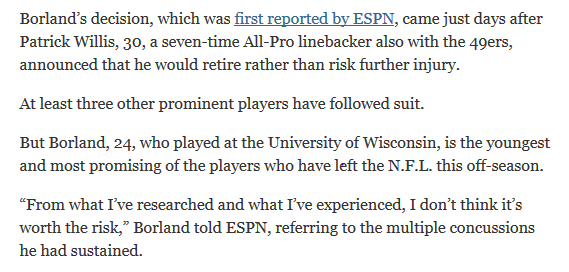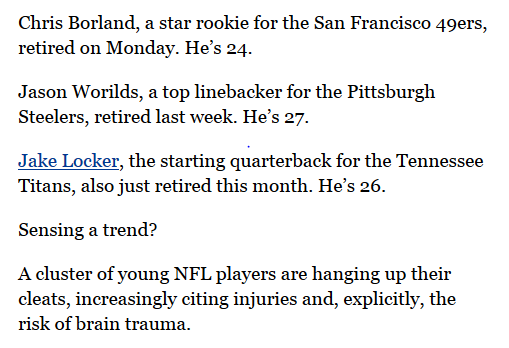Borland’s Surprise Announcement Sets Off a Reckless Writing Trend
We’ve witnessed this scenario far too frequently. A small piece of news hits the NFL headlines, and otherwise (presumably) intelligent writers scramble eagerly to be the first to conclude.
This fierce competition among NFL media to be the most insightful dot connector significantly contributes to a fan base that is often misinformed.
Those who love this game and avidly consume NFL content in writing deserve better…and that’s not an unreasonable request.
Yesterday was a particularly discouraging day in the NFL world.
The unexpected retirement announcement of twenty-four-year-old Chris Borland brought the less insightful analysts to the forefront in a predictably unsurprising manner.
It’s frustrating that I need to emphasize this point, even though it’s not the main focus of this column… but I wholeheartedly stand behind Borland’s choice to step away from the game early or whenever he deems fit.
Every individual who enters this league should prioritize what they believe is best for themselves and their loved ones – regardless of whether others think it’s right or wrong. Only Chris knows what’s truly in his best interest.
I find it hard to envision a scenario where my choice to play (or not play) wasn’t entirely my own. Chris did what he believed was in his own best interest, and that’s how it should be.
Professional football isn’t suited for everyone. If you’re inclined to avoid risk, this might not be a suitable game for you. There’s a path in life that doesn’t lead through any NFL stadium.
There’s absolutely no mandate to participate. However, the main focus of this column lies in examining the response to an announcement like Chris’s rather than dissecting the decision itself.
Narrative, Narrative, Narrative!
Scanning through yesterday’s deluge of articles on Chris Borland, one doesn’t have to search long before encountering the sensational and unsubstantiated claims leaping off the page.
What’s particularly disheartening is that much of this came from otherwise credible creators of NFL content that I regularly follow, not some obscure corner of the internet.
In my experience, the gravest offense in NFL sports writing willingly muddies the waters for the reader by blurring the boundaries of the facts you’re working with to bolster a shaky argument.
Unfortunately, this type of writing was more prevalent yesterday than unwanted debris in a gathering of sheep.
Here are some of the standout… or rather, regrettable moments:
In a column dated March 17th for the NY Times, Ken Belson included the following passage early in his piece on Borland:

If you were unaware of the context, the opening path might lead you to assume that Patrick Willis left the NFL to avoid a potential future injury, one he doesn’t currently have, opting to “retire rather than risk further injury.”
However, that notion doesn’t hold water. There’s no substantial link between Borland’s decision to leave the game and Willis’s.
Borland doesn’t currently experience any symptoms or issues related to concussions; it was the fear of such injuries that led him to step away. In essence, there’s no “further” risk in his case.
On the other hand, Willis recently underwent surgery on his big toe and struggled to regain his previous form.
Consequently, he made the decision not to continue. Willis explained:
“I have to be honest if I didn’t have [physically] what I know I need … I can’t be out there … collecting a paycheck. That would be wrong.”
I’m personally well-versed in this type of toe injury. In 2007, I underwent reconstruction of the tendons around my sesamoid bones (big toe).
After the surgery, I felt like a diminished version of myself, though the pain did subside to some extent.
I attempted to soldier through another year, but my foot simply didn’t function as it used to. Essentially, Willis is conveying a similar experience.
We all have busy lives, so the consumption of NFL content comes with it an expectation that we’re not being fed sewage.
In Belson’s column, the following sentence attempts to neatly link the idea of “retiring rather than risking future injury” with the statement, “At least three other prominent players have followed suit.”
However, this connection doesn’t hold true.
The only player who explicitly mentioned avoiding future injury was Borland.
Jake Locker, the former Titans quarterback who also recently retired, cited “no longer having a burning desire to play” as his reason, with no mention of injuries or fear of future ones.
Pittsburgh Steelers linebacker Jason Worilds, another unexpected retiree, mentioned “opting to pursue other interests.”
Since then, it’s been reported that Worilds is exploring a spiritual journey rather than continuing to play.
So, the common motivation among these four isn’t a fear of future injury. It’s quite a stretch.
Belson conveniently follows this up with a quote from Borland about concussions.
While there’s an attempt to muddy the waters, it’s worth noting that concussions aren’t a stated factor in the retirement decisions of anyone in this conversation except Chris Borland.
Belson’s approach of downplaying the candid reasons offered by Willis, Locker, and Worilds for leaving the game while potentially exploiting the reader’s lack of awareness to fabricate a concussion connection is shocking and irresponsible journalism at its worst.
But, of course, it’s just the NY Times… it’s not like they have a significant readership or anything.
Later in Belson’s NY Times piece, he drops this rather too-perfect nugget:

Indeed. When you serve people misinformation, it’s only natural for their opinions to become tainted.
I often wonder about the process through which these opinions take shape.
Pretending not to know the source of one’s chosen misinformation and then using people’s opinions as evidence of a problem is a strategy that could baffle even the most discerning readers.
While there is some genuinely well-intentioned content in Belson’s piece later on, the harm has already been done.
Readers across columns like this tend to retain fragments of information and an overarching impression.
In this case, the fabricated connection takes center stage, overshadowing everything else like mere background noise.
Yesterday, Dan Diamond penned a column on Forbes.com that tries to accomplish many of the same objectives as Belson’s piece in the NY Times.
To start, there’s the sensationalist headline predicting impending catastrophe – although it’s worth noting that writers often don’t have control over such headlines (shown below).

Diamond doesn’t hesitate, diving straight into the ambiguous core of his column:

Um… no. No discernible trend. Unless you’re referring to the fact that they’re all football players?
All three of these players retired for entirely different reasons. Only one explicitly cited “the risk of brain trauma” as a factor in his decision.
But the reader isn’t meant to be privy to that. There’s a looming narrative of impending doom that needs to permeate this story.
A lead stating, “A cluster of young NFL players are stepping away from the game,” with no apparent connection between their choices, would be rather inconvenient.
As I mentioned earlier, in the realm of responsible journalism, everything following this opening is essentially irrelevant.
The impression has been set… there’s a correlation, a pattern. The reader is already at a significant disadvantage. The nuances of “why” are conveniently disregarded.
The truth is, if there isn’t a connection, Dan doesn’t have a column. And that’s not acceptable.
This is where a skilled editor should step in and call out the lack of substance.
Unfortunately, in the case of this Forbes piece, it seems that didn’t happen.
Consequently, the muddled facts are disseminated on a national platform.
This last piece, an article by Michael Rosenberg on Sports Illustrated (si.com), claims the prize for recklessly forging connections:

Here’s the opening to the column. Yes, this is actually happening. Chris Borland. Aaron Hernandez. Join Mr. Rosenberg on this bewildering journey…
“It sure looks like Hernandez will spend the rest of his life in jail. And when he sits there, at age 50, he may be better off than if he had stayed in the NFL.”
Whoa. Sitting in jail for murder is better than a career in the NFL? Boom. He’s the King of Crazy Town. Get that man his Burger King crown…
Rosenberg proceeds to suggest that Borland is actively avoiding a self-inflicted gunshot wound to his chest, akin to what former Bears safety Dave Duerson and former Chargers linebacker Junior Seau experienced.
If you can scour the internet and find a more recklessly absurd connection in print from yesterday, consider yourself the web’s Magellan.
Following this logic, my choice to walk to work today was effectively a decision to avoid a potentially fiery car crash.
At the end of the day, I find it hard to believe that this was permitted to be published. It’s one of the most nonsensical things I can recall ever reading in an NFL column.
And that’s saying something, given the high bar.
Before I started writing this column, I made a quick list of five players I recalled conversing with during my nine years in NFL locker rooms.
Each openly discussed their reluctance to continue playing football for different reasons, and a few eventually acted on it.
Players deciding not to pursue another year or more due to a sense of not wanting to continue is far from a new occurrence.
Chris’s choice was distinctive given his age, early success, and absence of any current medical justification to act now. However, it stands alone.
NFL fans shouldn’t be expected to play detective for every piece of content they consume in a day.
We all lead busy lives, so when we engage with NFL material, there’s a reasonable expectation that we’re not being fed misinformation.
There were many other columns yesterday attempting the same approach as these three… don’t take my list here as exhaustive.
You have to get your NFL news and analysis from somewhere… but the chances that you unintentionally came across some poor-quality content yesterday are pretty high. Too high.
The NFL media community can certainly do better than it did yesterday.
Spreading baseless and lazy narratives throughout the NFL landscape is irresponsible and should be called out for what it is.
Chris Borland made a decision based on what was best for him. When there’s no further context to the story, you can’t just fabricate details…

